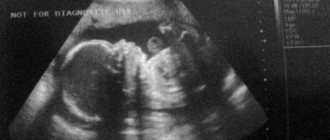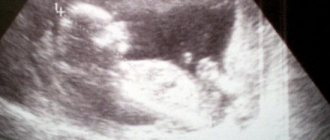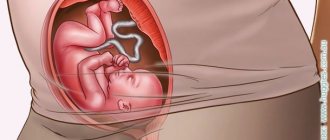The priorities of a modern woman have changed significantly over the past 10 years. She is building a career, engaged in self-knowledge, proving to the whole world that she is able to solve any problem. All this could not but affect one of the most important functions of her body - childbirth. Today, young girls are increasingly putting off adding to their families “for later,” not realizing that late pregnancy is not only the joy of motherhood, but also a huge risk for their personal health and the health of the unborn baby.
The impact of late pregnancy on mom's health
What are the dangers of late pregnancy? Carrying a child into adulthood can have both positive and negative effects on a woman. If at the time of conception the expectant mother managed to maintain good health, then pregnancy and subsequent breastfeeding can literally rejuvenate her due to a hormonal surge. At the same time, the risk of developing osteoporosis and cardiovascular pathologies is reduced, skin condition and emotional and psychological mood are improved.
But chronic diseases, even if a woman had no idea about them before, can worsen and cause complications during the period of bearing a child. In severe cases, it is necessary to terminate the pregnancy for medical reasons.
Women who have a history of preconception require special monitoring.:
- chronic diseases of the respiratory system (obstructive bronchitis, asthma);
- pathologies of the heart and blood vessels (heart disease, hypertension);
- diseases of the endocrine system (diabetes mellitus, thyroid disorders);
- diseases of the urinary system (pyelonephritis, urolithiasis).
Disadvantages of pregnancy in adulthood
A woman who decides to become a mother after 35 years must be aware of possible complications both for herself and for the baby. Late pregnancy requires careful and careful treatment in terms of diagnosis.
Pregnancy is a serious test of women's health. It can become a trigger for the exacerbation of a large number of diseases. The body experiences a huge hormonal and psycho-emotional shock, which can trigger the development of diseases such as:
- diabetes mellitus (gestational);
- thyroid diseases;
- cardiovascular diseases, hypertension;
- oncological diseases;
- kidney dysfunction.
In addition, the risk of gestosis (preeclampsia) increases significantly. It occurs against the background of existing diseases and is accompanied by a sharp increase in blood pressure, severe headaches, and swelling. Severe preeclampsia is very dangerous for the health of the woman and baby. It requires immediate hospitalization, constant monitoring and diagnosis, and in some cases, early delivery.
How to breathe properly and relax during childbirth
to give birth easily without complications?
Register for our free master class
and immediately after registration you will receive a free video lesson “How to relieve pain in childbirth?” Get it for free
Older pregnant women may have problems with pregnancy - there is a higher likelihood of a frozen pregnancy or spontaneous miscarriage. Abnormalities of the placenta, for example, previa or fetoplacental insufficiency, cannot be excluded.
There is a myth that age is a direct indication for a caesarean section. This is not entirely true: the choice of method of childbirth depends entirely on the woman’s health, the presence of chronic diseases and the position of the fetus before childbirth and other factors. However, at an older age, weak labor is more often observed, the muscles of the uterus contract weaker. In this case, doctors have the right to prescribe an emergency caesarean section.
What are the dangers of late pregnancy directly for the child? Unfortunately, the likelihood of chromosomal abnormalities and malformations increases. These include fairly common pathologies - Down, Patau or Edwards syndrome, and very rare ones. Thus, before the age of 25, the probability of having a child with Down syndrome is 1:1600, at 30 years old - 1:800, and at 40 years old - even 1:100. In addition, severe fetal pathologies often lead to missed pregnancy and miscarriage. Alas, in adulthood, about 50% of pregnancies end unsuccessfully in the first trimester.
Therefore, for her own peace of mind, it is better for the expectant mother to follow all the rules during pregnancy and carry out the entire set of studies for intrauterine malformations of the fetus. In particular, these are biochemical and ultrasound screenings, which are carried out before the 13th week of pregnancy. At this stage, as a rule, major genetic abnormalities are identified.
Positive and negative factors of late pregnancy
Pregnancy occurring later in life has many benefits. First of all, this is material well-being. By this time, as a rule, the woman has already established herself at work, she has a family and a regular income. She wants a child and is mentally ready for its appearance. The same can be said for fathers. After 35 years, men, as a rule, are more responsible; they pay more attention to the health of the mother and child, as well as raising the baby after his birth.
At this age, a woman perceives her improved body more easily and is more accepting of the need to change her lifestyle. Therefore, postpartum depression is an extremely rare phenomenon among mature mothers.
Since late pregnancy is most often desired, the woman prepares for conception and undergoes the necessary examination and treatment. Mother's feelings for the baby, as a rule, in this case awaken long before the baby is born.
It is a common belief that children born from late pregnancy are much more gifted than others. This is based on the fact that parents who have experienced this happiness at a later age pay a lot of attention to the development and upbringing of the child.
Pregnancy occurring in adulthood allows a woman to remain young longer. Her menopause comes later and is easier. The risk of stroke, osteoporosis, and heart attack is reduced.
But there is also a downside. First of all, this is an increased likelihood of exacerbation of all chronic diseases that have already accumulated in the body by this time. Due to this, the pregnancy itself can be difficult. During this period, severe early toxicosis, hypertension, diabetes mellitus and very often gestosis develop.
It has been proven that the older the expectant mother is, the higher the risk of having a baby with chromosomal abnormalities. Often, by the age of 40, a woman is diagnosed with polyps, endometriosis or uterine fibroids, which interfere with the normal attachment of the fertilized egg and contribute to miscarriages and premature birth.
A woman's muscle tissue loses its elasticity with age, so the likelihood of ruptures during childbirth and cesarean section increases.
The long-awaited pregnancy!
Touching upon the topic of pregnancy in adulthood, one cannot help but say something about women for whom the opportunity to become pregnant only with the help of medicine has become the only chance to experience the happiness of motherhood.
After all, the chances of giving birth for those over 30, and even over 40, are two times less than for young people, but these are at least some chances in comparison with the diagnosis, which 20 years ago sounded like a merciless sentence. Today, doctors urge women not to delay infertility treatment and to resort to assisted reproductive technologies, because the younger the patient, the greater the chance of success.
Features of late pregnancy
Let's look at how pregnancy progresses in adulthood.
After 35
Pregnancy after 35 years is accompanied by some risks. The likelihood of a baby being born with developmental defects increases. The chances of having a child with Down syndrome increase every year. And if at 25 years old they are equal to 1:1250, then at 35 years old they are already 1:378. The likelihood of a genetic pathology in a child is slightly lower if this is not the first birth.
On the other hand, existing chronic illnesses of the mother can provoke complications both in carrying the baby and in childbirth. Late first pregnancy at 37-40 years of age is a direct indication for cesarean section.
If it is not the first pregnancy at this age, then its risks are low, provided that the previous ones passed without complications. The level of modern medicine allows you to give birth to a healthy baby after 35 years.
After 40
By this age, more chronic ailments appear in a woman’s body, and the amount of hormones responsible for the ability to conceive and bear offspring decreases. Therefore, pregnancy that occurs during this period requires close attention from doctors throughout its entire duration.
The likelihood of complications in such a pregnancy increases. This is due both to the aging of the eggs and to their loss of the ability to produce sufficient amounts of hormones that help maintain pregnancy. After 40 years, premature placental abruption is more common than in younger women. At this age, pregnancy is highly likely to be complicated by gestosis, which is associated with the presence of chronic diseases in the expectant mother.
Pregnancies that occur after 40 years of age often have multiple births, which places an increased burden on the woman’s body. Half of births after 40 years are completed by caesarean section. This is due to a decrease in tissue elasticity and the mother’s health.
Late pregnancy after 40 years, and it does not matter at all whether it is the first or the second, carries an increased risk of chromosomal changes or malformations in the child. It often ends prematurely, and the baby is born with low birth weight.
But the possibility of all these complications should not stop a woman when the pregnancy is long-awaited and planned. It is necessary to prepare for this, have both parents examined, and treat chronic illnesses.
The most important thing during late pregnancy is the right psychological attitude. There is no need to panic or think about possible complications. It is important to undergo all necessary examinations in a timely manner, including for chromosomal mutations and developmental defects.
The probability of giving birth to a healthy child after 40 years of age is very high if the expectant mother has a responsible attitude towards the health of herself and the baby, subject to the recommendations of the attending physician.
After 45
Late pregnancy after 45 years requires a thoughtful and balanced approach. In most cases, it occurs with complications. Before deciding to take this step, the expectant mother is recommended to undergo a serious diagnosis of the state of her body.
At this age, the likelihood of:
- the birth of a baby with developmental defects or chromosomal abnormalities;
- complications of pregnancy and childbirth due to the accumulation of chronic diseases (hypertension, heart disease, etc.);
- miscarriages: approximately half of all pregnancies at this age are terminated before 20 weeks;
- cesarean section, especially if the late pregnancy is the first.
An expectant mother, when deciding to get pregnant after 45 years, should take into account that her energy reserves are not as large as at 20 years old, and the baby will have to pay a lot of attention. You also need to understand that physical recovery after childbirth in adulthood will require more time and effort.
However, not everything is as gloomy as it might seem. Often the question of pregnancy after 45 years confuses a woman. But there is no need to panic. Today medicine allows us to reduce the risk of complications to a minimum.
Answer yourself honestly: why do you need a child?
“The first thing you need to do is talk honestly with yourself and figure out why she wants to become a mother,” says Tamara Zeynalli. “If a woman takes this step because “I’m already forty and it’s time,” then, to put it mildly, she has no understanding of what a child is and what responsibility it is. They also give birth often so that in old age there is someone to give a glass of water. Or to fill a void in your life. Or because the husband wants it that way. I wouldn’t go on this journey with such motives. If you feel empty, consult a psychotherapist, fill your life, and then, when filled, decide to bring a person into this world. The motive that is a powerful foundation for a wonderful pregnancy and good birth is “I want to give life to a new person, I want to become a guide for him.”
Author: Irina Litvinenko
How to plan for late pregnancy?
It is recommended to prepare for pregnancy in advance. The level of modern medicine allows us to avoid most complications. It doesn’t matter whether a late pregnancy occurs at 35, 39 or 46 years old, first of all you need to get advice from a geneticist in order to minimize the risks of having a baby with genetic disorders.
Then you need to visit a gynecologist and certain specialists, including a mammologist. Chronic diseases should be treated before conception. It is recommended to undergo a short medical examination, which includes a consultation with an endocrinologist, a study of hormonal status, a visit to a cardiologist, a therapist, an ultrasound examination of internal organs, blood vessels of the legs, and analysis for infections.
Planning for late pregnancy also involves giving up bad habits for both parents. The expectant mother needs to lead a healthy lifestyle, get proper rest and eat right.
Five Steps to Preparation
If a mother, after weighing all the pros and cons, decides on a late pregnancy, she needs to carefully prepare for it. Natalya Knyazeva told how.
- In addition to the gynecologist, you need to consult related specialists if you have chronic diseases. It is especially necessary to check the functioning of the liver and biliary system, because this is a biochemical factory. Hormone metabolism occurs here. A visit to an endocrinologist is required to check how healthy the thyroid gland is. Now among pregnant women, regardless of age, there are many cases of hyperthyroidism and autoimmune thyroiditis. A medical examination by a therapist is important: monitoring blood pressure and sugar levels.
- The oral cavity needs sanitation.
- Complete abstinence from nicotine, alcohol, and intake of folic acid (three months before conception, because the egg is formed during this period).
- If there are no antibodies to rubella, you need to get vaccinated against this disease.
- Natalya Silina also advises managing chronic stress, because it is stress that kills the thyroid gland, adrenal glands and ovaries. According to the expert, a full six to eight hours of sleep from 11 pm in a completely dark room can help (this is how the brain, which regulates all processes in our body, fully rests) and meditation (it relieves increased excitability of the brain).
If the pregnancy was not planned
The phenomenon when the latest pregnancy occurs completely unexpectedly for a woman is quite common. This event causes bewilderment both for the expectant mother and for the entire environment. Many are not ready for this and, out of fear of difficulties, decide to terminate the pregnancy. But in reality, everything is not as scary as it seems.
Even if a late pregnancy was not planned, a responsible approach to its course will allow it to end safely.
For this we can recommend:
- reduce physical and psychological stress in the first trimester of pregnancy, for which you can take time off from work;
- if there is no threat of miscarriage, then with the doctor’s permission, lead an active lifestyle, perform specially selected gymnastics;
- to refuse from bad habits;
- pay great attention to nutrition, which should be healthy and balanced;
- with the help of a gynecologist, control the list of medications consumed so as not to harm the baby;
- choose a doctor whom the expectant mother trusts to manage pregnancy and childbirth.
Weigh the pros and cons
The idea to speculate on the topic of “childbirth after 40 years” did not arise by chance. The reason was a meeting with a friend whom I had not seen for two years. I barely recognized 43-year-old Elena - slimmer, prettier, she was all glowing from the inside. It is clear that in front of you is a happy person. As it turned out, three months ago she became a mother for the second time. By the way, Lena’s eldest son is 20 years old.
“It’s as if my wings have grown, my whole life has changed,” a friend shared her joy.
After the collapse of her first marriage and uncertainty, Lena met Alexander. The man also went through a divorce; there were no children with his ex-wife.
“In the two years of our marriage with Sasha, I didn’t even think about having a child together,” the woman admits. – To be honest, I was sure that I would no longer be able to get pregnant. And when at one fine moment I realized that it was time to run to the pharmacy for a test, I began to panic. The pregnancy was confirmed by a subsequent ultrasound. The husband was incredibly happy and did not think about terminating the pregnancy.
Indeed, most people talk about pregnancy, childbirth and motherhood “after 40” with caution, and some even with undisguised horror. This is how myths are born, often having nothing to do with reality. And endless horror stories about relatives, friends, or heard on TV can drive even the most balanced person crazy, not to mention a pregnant woman. All this several times increases the fear for one’s own and the health of the unborn baby - and this is a truly negative factor for the expectant mother. And she involuntarily begins to calculate how old she will be when the baby goes to school, when he graduates, gets married, which also does not add peace of mind.
After weighing all the pros and cons, discussing the situation with her eldest son and mother, Elena became registered.
And here, according to her, real hell began in the form of endless examinations. Several times I had to go to the hospital with a diagnosis of “threatened miscarriage.”
“I didn’t refuse a single examination - at my age the risks of fetal pathologies are too great,” says a friend. – Now my husband and I are absolutely happy – the baby was born healthy.
After the caesarean section, she did not recover for long, she feels rejuvenated, capable of moving mountains. Elena is confident that she has enough strength to raise and put her son on his feet.
Caesarean section or natural birth?
Late pregnancy and natural childbirth are not mutually exclusive. Indeed, women over 35 years of age undergo Caesarean sections twice as often as younger women giving birth. But this is not always due to medical reasons. Doctors often play it safe, thus reducing the risk of complications during childbirth to a minimum. After all, if something goes wrong at such a crucial moment, then a mature woman in labor may no longer have a chance of repeating it.
But many women after 35 years are able to give birth naturally. They tolerate contractions and pain well. If the pregnancy proceeds without complications, and there are no clear indications for a cesarean section, then a natural birth is quite possible.
How to prepare for late childbirth?
When preparing for late childbirth, you need to find out from your doctor whether it is possible to carry it out naturally. If a caesarean section is necessary, you should prepare yourself psychologically for it. If there are no contraindications to natural childbirth, then it is recommended to take good courses for pregnant women to prepare for childbirth. They are not cheap, but they provide many useful skills.
When preparing for childbirth, it is recommended to choose in advance a qualified doctor who will be with the woman in labor from the first minutes of the process. The clinic where the woman will give birth must be equipped with a neonatal intensive care unit. This is due to the fact that late labor is often protracted, and babies experience hypoxia.
After 35 years, it is not recommended to give birth at home. You should not give in to fashionable sentiments, because the older the woman, the higher the risk of complicated childbirth. It is recommended to listen carefully and follow the doctor's recommendations.
In many ways, success in childbirth is determined by the correct positive attitude of the expectant mother. It is necessary to distinguish between the concepts “above” and “high”. Yes, the risk of complications during childbirth during late pregnancy is higher than for twenty-year-old mothers. But it does not at all exclude, if a woman is responsible, a high probability of a normal natural birth and the birth of an absolutely healthy baby.
Late pregnancy delivery methods
Until recently, all women giving birth over 30 years of age were prescribed a planned caesarean section. Today doctors are trying to guide a woman to spontaneous childbirth. But alas, this is not always possible. Planned surgical benefits are prescribed for the following indications:
- narrow pelvis or large fetus;
- incorrect presentation of the fetus (breech, placental, transverse);
- severe gestosis;
- multiple pregnancy;
- scars on the uterus and repeated caesarean section;
- severe pathologies of the mother in labor (heart disease, eye disease, diabetes mellitus);
- post-term pregnancy;
- lack of response to drug induction of labor.
If a woman gives birth to her second or third child, the natural process may go faster than for a first-time mother. Although here, too, problems often arise with the dilatation of the cervix, which increases the time of labor.
How to avoid complications during childbirth
Complications that may arise during spontaneous childbirth:
- weak labor activity;
- ruptures of the cervix and vagina due to decreased tissue elasticity;
- a blood clotting disorder leading to bleeding and other serious complications;
- acute complications such as retinal detachment, heart attack and stroke.
It is difficult to influence the dilation of the cervix and labor, but it is possible and necessary to gain strength for the upcoming difficult birth. Prevention of complications during childbirth consists of a correct lifestyle during pregnancy, strict adherence to medical recommendations, participation in permitted sports and special gymnastics for pregnant women . During the birth process, you must listen to your obstetrician-gynecologist and perform the necessary actions.
Preventing risks for mother and child
Late pregnancy carries increased risks for both mother and baby. For a woman, this is the risk of miscarriages, exacerbation of chronic diseases, diabetes, gestosis, premature and complicated births. For a baby, this is a risk of genetic abnormalities, developmental defects, low weight and hypoxia.
Despite this, risk prevention allows most late pregnancies to result in the successful birth of a healthy child.
Prevention includes:
- comprehensive examination at the pregnancy planning stage;
- early registration at the antenatal clinic;
- adherence to a work and rest regime, a healthy lifestyle: it is important not to overload yourself, monitor your health, maintain moderate physical activity and eat right;
- screening for early detection of fetal malformations.
Today, pregnancy after 35 years will not surprise anyone. Late motherhood has many benefits. This includes a woman’s successful career, a responsible approach to the birth of a child, and anticipation of the event itself. But at the same time, late pregnancy carries certain risks for both mother and baby. To minimize them, it is necessary to plan your pregnancy, conduct fetal development screening, lead a healthy lifestyle and remember that even after 45 years, the probability of having a healthy child is very high.
Author: Olga Khanova, doctor, especially for Mama66.ru











